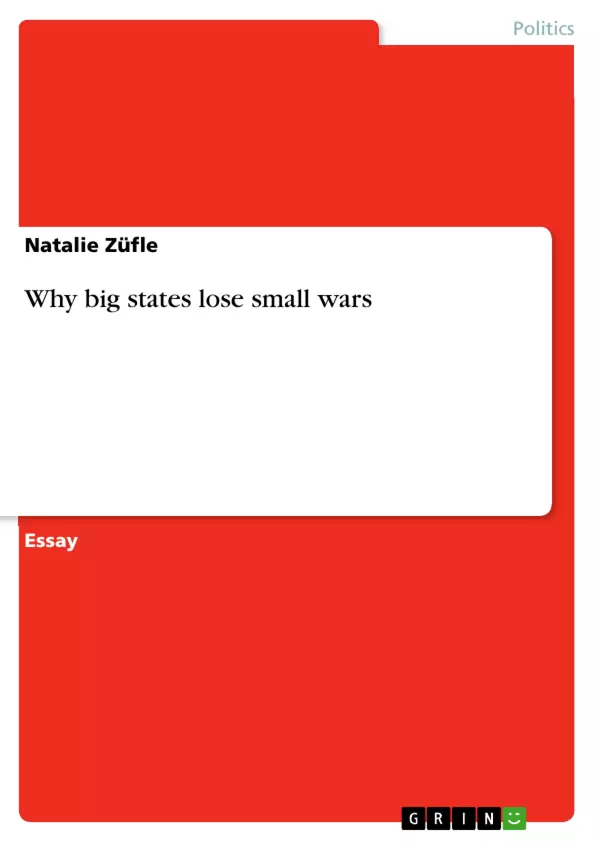Warfare patterns have changed in a number of aspects which make it more difficult for regular state armies to defeat a non-state opponent. A
Inhaltsverzeichnis (Table of Contents)
- Global Risks
- Modified Patterns of Warfare
- New Key Players
- Unconventional Form of Warfare
- Protracted Warfare
- Psychological Costs of War
- Deterritorialization of War
- Undermining Conventions and Rules
Zielsetzung und Themenschwerpunkte (Objectives and Key Themes)
This essay examines the reasons behind the frequent defeat of large states in small wars. It explores the complexities of warfare between states and non-state actors, focusing on the challenges posed by new forms of conflict and the strategic advantages often held by smaller, less conventional forces.
- The shift from traditional interstate wars to "irregular warfare" involving non-state actors.
- The asymmetric nature of these conflicts, characterized by the disparity in resources and capabilities between state and non-state actors.
- The strategic advantages held by non-state actors, including unconventional tactics, prolonged warfare, and psychological warfare.
- The limitations imposed on large states in dealing with these unconventional forms of conflict, including the difficulties of maintaining public support and the challenges of confronting a dispersed enemy.
- The breakdown of traditional rules of warfare and the resulting escalation of brutality in small wars.
Zusammenfassung der Kapitel (Chapter Summaries)
The essay begins by introducing the concept of "small wars" as a distinct category of conflict that emerged after the Cold War. It highlights the growing prevalence of inner-state wars and the inherent asymmetry between state and non-state actors involved in these conflicts.
The core argument revolves around the concept of "irregular warfare" and its implications for large state actors. The essay examines key characteristics of this new form of warfare, including the emergence of non-state actors, unconventional tactics, protracted warfare, and the exploitation of psychological warfare.
The essay explores how these characteristics challenge the traditional methods and strategies employed by large states in conventional warfare, leading to difficulties in maintaining public support, controlling the battlefield, and achieving decisive victory.
Finally, the essay discusses the breakdown of traditional rules of warfare in "small wars," leading to increased brutality and a blurring of lines between civilian and military targets.
Schlüsselwörter (Keywords)
The key terms and concepts explored in this essay include irregular warfare, asymmetric conflict, non-state actors, protracted warfare, psychological warfare, deterritorialization of war, and the breakdown of conventions in warfare.
- Quote paper
- Natalie Züfle (Author), 2008, Why big states lose small wars , Munich, GRIN Verlag, https://www.hausarbeiten.de/document/180078


